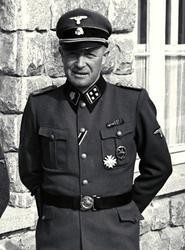Pochodzący z Monachium Franz Ziereis kształcił się w dziedzinie handlu. Wstąpił do Reichswehry, w której służył przez 12 lat, osiągnął stopień sierżanta i odszedł ze służby w 1936 roku. Następnie związał swoją karierę z SS - Ziereis zastąpił Alberta Sauera na stanowisku komendanta obozu Mauthausen, który wraz z wybuchem wojny został wysłany do okupowanej Polski w celu zorganizowania przesiedleń ludności polskiej i żydowskiej z terenów wcielonych do III Rzeszy.
Ziereis był odpowiedzialny za warunki panujące w obozie. Więźniowie byli zmuszani do katorżniczej pracy w kamieniołomach, a ciężka praca w połączeniu ze skandalicznymi warunkami sanitarnymi, a także słabym wyżywieniem, tworzyły śmiertelną mieszankę dla uwięzionych tam ludzi.
Ziereis osobiście znęcał się nad swoimi ofiarami, a następnie je mordował. Z relacji ocalałych wynika, że pozwalał swojemu nieletniemu synowi strzelać do więźniów ze strzelby. Komendant brał również udział w uśmiercaniu ludzi w komorze gazowej, która działała w Mauthausen od 1942 roku.
Franz Ziereis chciał zaimponować samemu Heinrichowi Himmlerowi nie tylko śmiercionośną skutecznością kierowanego przez siebie obozu, ale także prowadząc badania archeologiczne. Zdarzyło się bowiem, że jeden z polskich więźniów, Kazimierz Gelinek, pracując przy budowie nasypu kolejowego, natrafił na znaleziska archeologiczne, o czym poinformował władze obozu. Niemiecki Instytut Ochrony Zabytków zlecił badania, w podobozie Gusen powstało nawet muzeum obozowe, a Gelinkowi, który kierował wykopaliskami, zlecono przygotowanie monografii znalezionych zabytków. Powstało pięć egzemplarzy książki, a jeden z nich został wręczony Himmlerowi podczas jego wizyty w obozie.
W obliczu zbliżającej się armii amerykańskiej w 1945 roku, Ziereis uciekł wraz z żoną i synem i ukrył się w górach Górnej Austrii. Został jednak znaleziony przez Amerykanów, którzy postrzelili go kilka razy, gdy próbował uciec. Ranny Ziereis został przewieziony do Gusen, gdzie alianci założyli szpital. Były komendant obozu Mauthausen został poddany operacji, choć jego stan stale się pogarszał. Przed śmiercią udało się go przesłuchać, a amerykańskiemu wojsku towarzyszyła grupa polskich więźniów, którzy udokumentowali przesłuchanie. Podczas ostatniej „spowiedzi” Ziereis opowiedział o zbrodniach w obozie. Przyznał, że zabijał ludzi własnymi rękami. Stwierdził nawet:
Pomimo faktu, że wszystkie kary cielesne musiały być zatwierdzone przez Berlin, często biłem więźniów dla przyjemności.
Jednocześnie w swoich zeznaniach, które złożył dobrowolnie, winą za zbrodnie w podległych mu obozach obarczał swoich przełożonych. Opisywał zbrodnie w innych obozach, a także to, jak dowództwo obozu z Oranienburga wysyłało komendantów obozów do Sachsenhausen na szkolenia z jak najskuteczniejszego i najszybszego zabijania.
Komendant Mauthausen zmarł półtorej godziny po przesłuchaniu.
